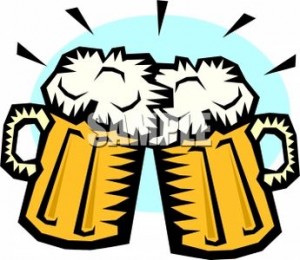On June 8, 2010, The New York Times ran an article about a new drinking game trend that encourages binge drinking, icing, that’s spread from college campuses across the U.S. to social networking sites, such as Twitter and Facebook, to blogs. It has become the first viral drinking game.
 “Icing” involves the malt beverage Smirnoff Ice. The premise of the game is that at any social gathering a friend might hand another friend a Smirnoff Ice (typically a warm one), and the receiver has to drink all of it at once while kneeling on one knee. However, if the receiver is carrying a bottle of Smirnoff Ice himself (the game is more popular among men than women), then the initial giver must drink both of the bottles, all at once, while kneeling on one knee. Most of the participants describe Smirnoff Ice as an unpleasant drink, which heightens the aspect of losing and reinforces the carrying of defense Ice. It’s no surprise that the sales of Smirnoff Ice has skyrocketed.
“Icing” involves the malt beverage Smirnoff Ice. The premise of the game is that at any social gathering a friend might hand another friend a Smirnoff Ice (typically a warm one), and the receiver has to drink all of it at once while kneeling on one knee. However, if the receiver is carrying a bottle of Smirnoff Ice himself (the game is more popular among men than women), then the initial giver must drink both of the bottles, all at once, while kneeling on one knee. Most of the participants describe Smirnoff Ice as an unpleasant drink, which heightens the aspect of losing and reinforces the carrying of defense Ice. It’s no surprise that the sales of Smirnoff Ice has skyrocketed.
Many have questioned Smirnoff Ice’s involvement in the viral ad campaign, but Smirnoff has denied all accusations. Some young adults who documented the spread of the game said that many would stop Icing “if it turns out that they’re being used to market a drink they don’t really like.”
Smirnoff Ice and its parent company released a statement that read: “Icing is consumer-generated, and some people think it is fun. We never want under-age ‘icing’ and we always want responsible drinking.” However, the very nature of the game, through it’s encouragement of the dangerous act of binge drinking, is irresponsible. Whether involved or not, it seems the responsible thing for Smirnoff Ice to do at this point would be discourage such games as “Icing” and to remind its consumers about the dangers of binge drinking. They should not be reiterating the game as something that people think is ‘fun’.
No matter under-age or of-age, making a game of binge drinking is always dangerous.
Here are some health problems associated with binge drinking:
- Alcohol poisoning.
- Liver disease.
- High blood pressure, stroke, and other forms of cardiovascular disease.
- Neurological damage.
- Sexually transmitted diseases.
- Unintentional pregnancy.
- Fetal Alcohol Syndrome (if pregnant women binge drink).
- Unintentional injuries (such as car accidents, falls, etc.).
- Intentional injuries (such as injuries from firearms, domestic violence, etc.).
In addition, studies have shown that the younger one begins drinking, the more likely they are to develop alcohol dependence.


